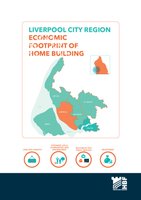House building up by 68% in Liverpool since 2012
A new report released today, based on research carried out by Lichfields for the Home Builders Federation (HBF), shows the huge contribution house building is making to the Liverpool City Region economy[1]. Over 5,500 new homes were provided in the region over the last year, generating over £900 million to the local economy.
As well as being a major employer and supporter of local supply chain businesses, new developments make significant contributions towards local infrastructure and amenities through development taxes.
The report shows that in 2017/18, house building was responsible for:
- Supporting over 17,000 local jobs
- Delivering over £936 million of economic activity
- Generating over £66m of tax, the equivalent of employing approximately 3,008 newly qualified nurses[2]
- Delivering over £4.4m of spending on new and improved schools, the equivalent of employing 188 additional teachers[3], or funding 947 additional primary school places[4]
- Generated an investment of over £150m in new Affordable Housing
The report also underlines the impact the Government’s Help to Buy scheme is having in the region. Over 5,300 properties have been purchased using the scheme across the Liverpool City Region since its launch in 2013, with 86% of those purchases coming from first time buyers. This is 5% higher than the national average.
Since the scheme launched, home building has increased by 167% in Knowsley. Liverpool delivered a massive 126% increase in housing over this period, followed by 59% in St Helens.
Stewart Baseley, Executive Chairman at the Home Builders Federation, said; “For too long the vast social and economic benefits of house building have gone unnoticed in our communities. This research shows that the home building industry is delivering much more than bricks and mortar and by working with Metro Mayor Steve Rotheram, and the local authorities, it is helping to provide a massive economic boost to the Liverpool City Region. Over the last five years house building has given the economy a £930m shot in the arm and provided much-needed additional funding for local schools and community facilities.
“With the Government’s target to build 300,000 new homes every year until the mid-2020’s, the Liverpool City Region should continue to see these benefits increase. The Home Builders Federation looks forward to maintaining its positive engagement with Mayor Rotheram.”
Colin Robinson, Planning Director at Lichfields, said; “We were delighted to be asked by the HBF last year to prepare a national report into the economic benefits of housebuilding. This latest regional economic footprint of housebuilding report follows on from this nationwide study, and demonstrates yet again the very significant economic contribution made by housebuilding in the Liverpool City Region. It shows how boosting supply will not only help improve access to housing for people across the sub-region, but how it can also deliver a significant economic and infrastructure dividend. It is critical that this contribution is properly recognised in planning and investment decisions, with the emerging LCR Spatial Development Strategy offering a once in a generation opportunity to facilitate future economic growth and accelerate housing delivery in these uncertain times.”
If the Government’s target of building 300,000 homes per year was achieved it would mean an extra 930,000 jobs created across England, and a massive £8.32bn pumped into new affordable housing.
Housing is inextricably linked to the wider health of the economy and it is often referred to as a key barometer of national economic performance. But it is also important to recognise that it also has a range of significant effects on economic performance at regional and local levels too. In particular, house building:
- Drives regional economic growth through its vast and varied supply chains and contracting relationships;
- Generates unrivalled investment multiplier effects with very little import leakage due to the extensive use of local and regional suppliers and services;
- Delivers real jobs both on-site and off-site in associated trades, such as cement production and brick manufacturing, as well as in research and development fields looking at technological innovation areas such as Modern Methods of Construction;
- Creates economic value through new residents as they spend money on goods and services in the local economy;
- Supports labour market mobility wellbeing by enabling local people to move jobs freely and achieve their economic potential;
- Enhances “place competitiveness” and local economic development by improving the perceived competitiveness of specific locations and reducing the costs of mitigating social and environmental problems associated with poor or insufficient housing.
[1] For the purposes of this report, Liverpool City Region refers to the six local authority areas of Halton, Knowsley, Liverpool, Sefton, St Helens and Wirral
[2] Royal College of Nursing, NHS Pay Scales 2017-18
[3] Prospects, How much do teachers get paid? July 2018
[4] BBC News, Seven charts on the £73,000 cost of educating a child, 19 November 2018
- ENDS -
For media enquiries, or to arrange an interview, please contact Claire Coward on 020 7960 1614 or 077 3268 2114. claire.coward@hbf.co.uk
Notes to editors
- The Home Builders Federation (HBF) is the representative body of the home building industry in England and Wales. The HBF’s member firms account for some 80% of all new homes built in England and Wales in any one year, and include companies of all sizes, ranging from multi-national, household names through regionally based businesses to small local companies: hbf.co.uk
- Please see the Liverpool Economic Footprint Report for more detailed figures
